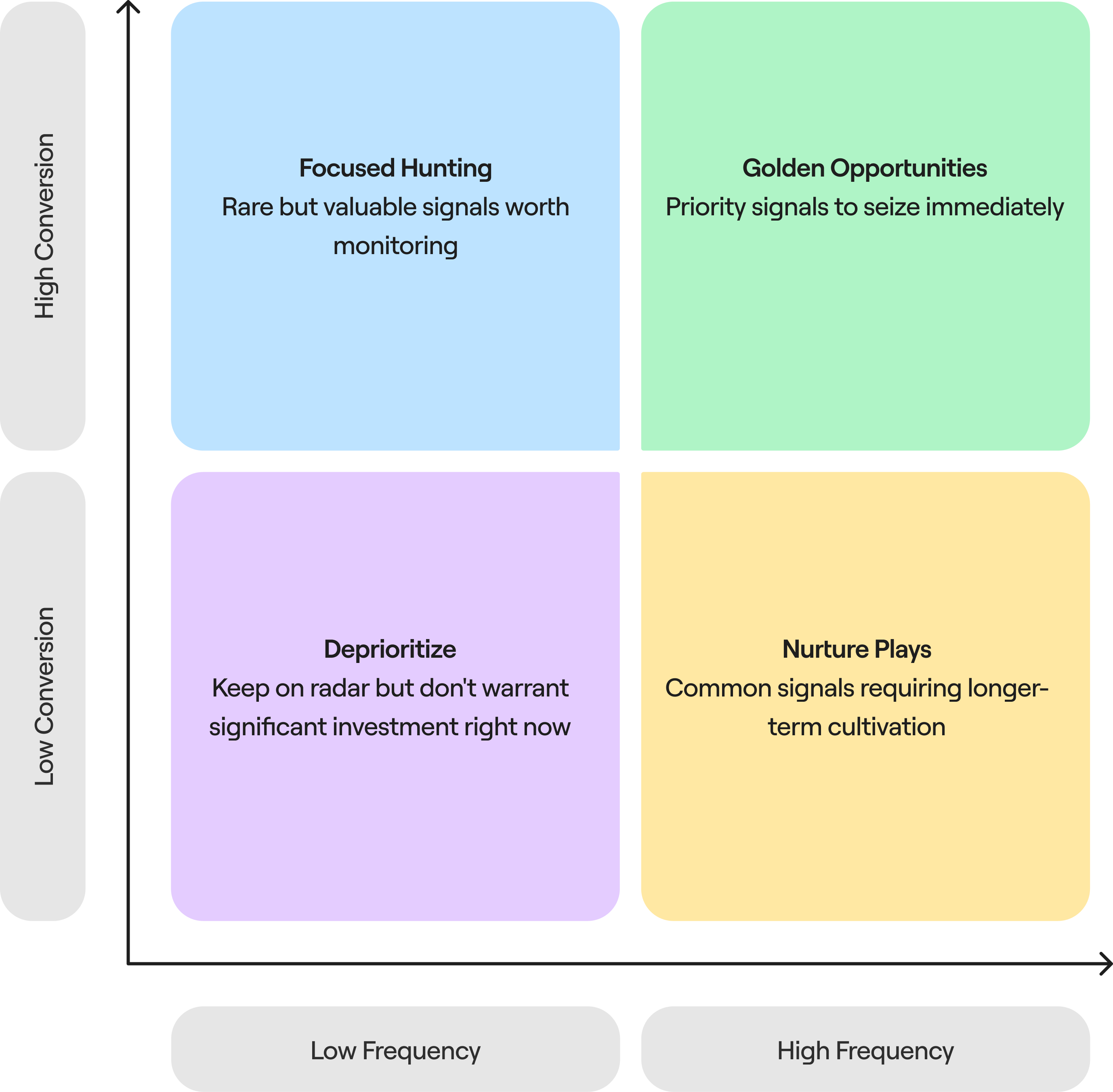📡 Introduction to Signals: Proactive Opportunity Detection
In Clay 101, we've covered the fundamentals—from basic enrichment to advanced AI transformations and multi-stage workflows. You've learned how to find, enrich, and qualify prospects at scale.
But here's the thing: even sophisticated prospecting workflows are still reactive. You're finding companies that fit your ICP, but you're not catching them at the right moment when they're actually ready to buy.
Today, we're diving into real-time signal detection that transforms your GTM motion from reactive prospecting to proactive opportunity capture. By the end of this lesson, you'll understand what signals are, why they're critical for modern GTM teams, and how to identify signal opportunities within your own market.
🎯 What Are Signals?
Signals are dynamic monitoring systems that detect buying intent in real-time. Think of them as your always-on radar system, constantly scanning the market for companies showing signs they might need your product or service.
The Timing Problem
In B2B sales, timing is everything. You can have perfect product-market fit, compelling value propositions, and a great sales team, but if you reach out at the wrong time, none of that matters.
Signals solve this by identifying the exact moment when a company transitions from not needing your solution to actively looking for one. Instead of hoping you catch prospects during their buying window, you're systematically monitoring for the business events that create those windows.
📈 The Evolution of Signal Detection
GTM teams have approached timing in three distinct eras:
Era 1: Manual Research - Sales reps spent hours scrolling LinkedIn, reading company blogs, and setting up Google alerts. Time-intensive, inconsistent, and couldn't scale beyond 20-30 accounts.
Era 2: Intent Data - Companies bought lists of accounts searching for relevant keywords. Better than manual, but still reactive—by the time someone's searching, they're already evaluating multiple competitors.
Today: Automated Intelligence - With Clay, we're proactively monitoring for business events that create needs before prospects even realize they should be evaluating solutions.
🔍 The Four Categories of B2B Signals
Intent Signals
Companies researching your category, visiting competitor websites, or downloading relevant content. These are valuable but late-stage— it’s likely that prospects are already comparing and evaluating solutions.
Growth Signals
Companies scaling rapidly, creating immediate needs for new tools:
- Funding announcements indicating new budget
- Aggressive hiring patterns requiring new systems
- New office openings suggesting expansion
- Significant web traffic increases needing support
Change Signals
Transitions that create new needs and disrupt existing vendor relationships:
- Leadership changes, especially new CMOs, CTOs, or VPs of Sales
- Technology migrations showing active infrastructure investment
- Organizational restructuring indicating strategic shifts
- New business line launches requiring supporting technology
Distress Signals
Challenges that create urgency and openness to change:
- Negative reviews mentioning specific pain points
- Compliance violations creating immediate pressure
- Public complaints about current vendors
- System outages revealing infrastructure problems
⏱️ Why Signals Matter More Than Ever
Three major shifts make signal-based GTM essential:
Market Saturation: B2B buyers have more options than ever. When features and pricing are commoditized, timing becomes your biggest differentiator.
Buyer Behavior Transformation: Buyers do extensive self-service research before talking to sales, expect personalized omnichannel experiences, and involve more stakeholders in longer, more complex sales cycles.
Rising CAC and Budget Pressure: Traditional spray-and-pray approaches are economically unsustainable. GTM teams need surgical precision, focusing on highest-probability opportunities.
The shift is clear: from reactive (waiting for prospects to raise their hand) to proactive (anticipating when need is created).
💼 Real-World Example: Vanta
Vanta built a sophisticated signal system that monitors for business events creating the need for SOC2 certification:
- Funding announcements: Newly funded companies often need compliance certifications to close enterprise deals
- Hiring patterns: Specifically companies hiring security engineers or compliance officers
- AI content analysis: Analyzing communications and job postings for organizations seeking SOC2 certification
Result: Vanta reaches out at the exact moment prospects realize they need compliance automation—often before they know solutions like Vanta exist or have begun evaluating alternatives.
🎨 Real-World Example: Canva
Canva monitors social media for visual content showing brand inconsistencies. Their AI analyzes posts for:
- Inconsistent fonts across materials
- Off-brand colors
- Poorly aligned logos
- Spacing and layout issues
When they identify brand consistency problems, they automatically reach out to heads of brand or design—often within hours of the problematic content being posted. They're engaging at the exact moment the problem is top-of-mind, with concrete examples.
🧠 Exercise: Identify Your Signal Opportunities
Brainstorm 10 potential signals relevant for your product or service. Consider:
Growth Signals: What happens when companies scale that creates demand for your solution?
Change Signals: What transitions or shifts create new needs?
Distress Signals: What problems does your product solve that might be publicly visible?
Create Your Prioritization Matrix
Plot your signals on two dimensions:
- Frequency: How often does this signal occur in your target market?
- Conversion Potential: How likely is this signal to result in a sale?
Signals scoring high on both frequency and conversion potential are your golden opportunities—prioritize these as you build your signal detection systems.

✅ Key Takeaways
Signals transform GTM from reactive prospecting to proactive opportunity capture by detecting buying intent in real-time. The four signal categories—intent, growth, change, and distress—each reveal different types of buying opportunities.
Market saturation, buyer behavior changes, and rising CAC make signal-based GTM essential rather than optional. The competitive advantage now comes from better timing—reaching prospects at exactly the right moment.
With Clay, you can build sophisticated automated systems that detect the specific signals that matter for your business, catching companies before they even realize they need to evaluate solutions.
Ready to build your own monitoring systems? In our next lesson, we'll dive into Clay's default signals and show you how to set up monitoring for the most common GTM use cases.
Connect, explore and learn together
Read our GTM blog, or try out our top Claybooks and templates to transform your growth ideas into outreach in minutes.





















